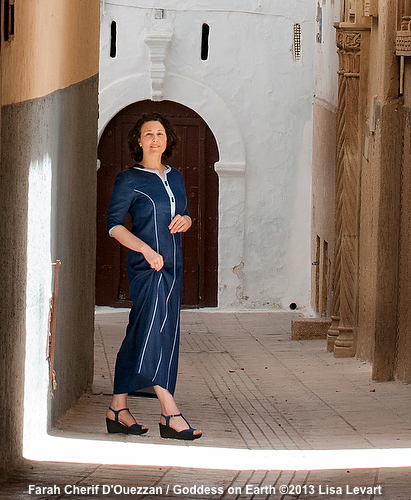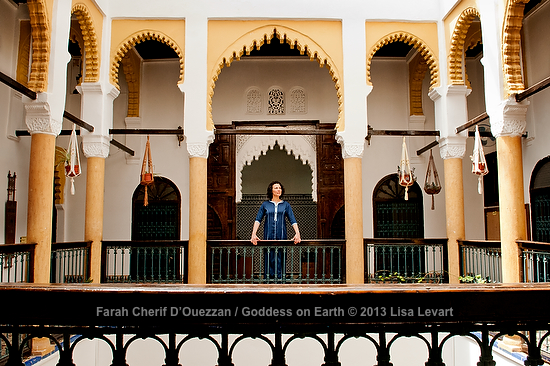During my recent trip to Morocco, there were times when it seemed like I had stepped into the movie Blade Runner. I was bombarded by a hectic energy -- an ancient way of life adapting to and colliding with the 21st century. There were women covered head to toe in black burkas riding in donkey carts, young and old men in long, hooded robes checking their cell phones, bloody goat heads displayed haphazardly by meat vendors, and lost tourists photographing their surroundings to help remember their way through the Esher-like streets of the old medinas. I experienced all this while dodging a barrage of motorcycles plowing through the crowds. Was I reacting to sensory overload, the juxtaposition of the old and new, or the disorientation from encountering an unknown culture?
 One woman who would applaud my "fish out of water" experience was Farah Cherif D'Ouezzan, the Founder and Director of the Center for Cross Cultural Learning in Rabat, Morocco. I met Farah on the first weekend of my adventure, and she gamely agreed to be photographed for Goddess on Earth. One of the many joys of photographing women for this series is its basic premise -- the subjects themselves choose the sacred myth they connect with, and wish to embody for their portrait.
One woman who would applaud my "fish out of water" experience was Farah Cherif D'Ouezzan, the Founder and Director of the Center for Cross Cultural Learning in Rabat, Morocco. I met Farah on the first weekend of my adventure, and she gamely agreed to be photographed for Goddess on Earth. One of the many joys of photographing women for this series is its basic premise -- the subjects themselves choose the sacred myth they connect with, and wish to embody for their portrait.
Farah's choice of the Queen of Sheba is one of the few women immortalized in the sacred texts of Judaism, Christianity and Islam. As the 3,000-year-old story goes, Sheba was a powerful and educated leader who traveled a great distance to question, test, and learn from the famed King Solomon. She converted to Solomon's monotheistic religion and brought this new faith back to her people. Farah sees Sheba as a bridge builder, someone connecting different religions and asking fundamental questions such as "Who am I?" and "With whom do I belong?"

Farah's realized dream, her educational center, is a peaceful oasis in the ancient medina of Morocco's capital city. College students from all over the world come to learn empathy, awareness, and respect for Moroccan culture. She teaches the commonality of cultures and how to look at different social values without passing judgment.
After we photographed, Farah shared why she chose to portray the Queen of Sheba:
"I have always envisioned Sheba as a strong human being who can bring the world together, a power able to overcome all challenges to accomplish impossible missions and make dreams become true. Queen of Sheba belongs to every culture and every community and draws all of them to come together peacefully."
In Morocco, I travelled from the beautiful northern mountainside village of Chefchaouen to the sands of the Sahara. But out of all these well-formed wonders, it is the Moroccan culture that will leave the longest lasting impression upon me. My original feelings of being alien and lost in this colorful world slowly gave way to a more nuanced and personal understanding of the Moroccan way of life. It is due to women like Farah and the ever-present influence of the Queen of Sheba that these kind of cross-cultural revelations are possible.
'Goddess on Earth' is available at: www.goddessonearth.com or join the Goddess on Earth community on Facebook.
